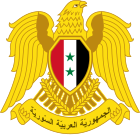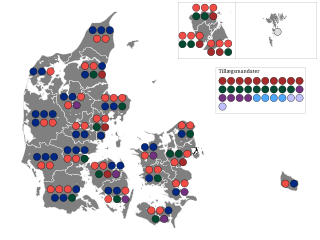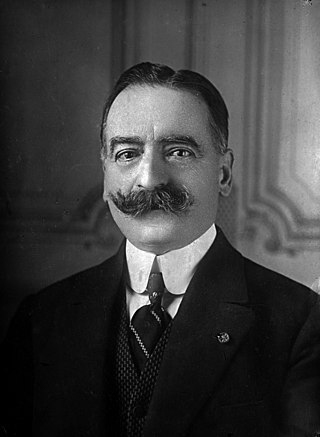 |
|---|
|
Constitutional Assembly elections were held in Syria on 16 November 1949, with a second round on 25 November. [1] The result was a victory for the People's Party, which won 63 of the 113 seats. [2]
 |
|---|
|
Constitutional Assembly elections were held in Syria on 16 November 1949, with a second round on 25 November. [1] The result was a victory for the People's Party, which won 63 of the 113 seats. [2]
 | ||
|---|---|---|
| Party | Seats | |
| People's Party | 63 | |
| National Party | 13 | |
| Islamic Socialist Front | 4 | |
| Arab Socialist Party | 1 | |
| Syrian Social Nationalist Party | 1 | |
| Independents | 31 | |
| Total | 113 | |
| Source: Nohlen et al. | ||

Early parliamentary elections were held in Austria on 24 November 2002, after internal divisions in the Freedom Party of Austria (FPÖ) culminating in the Knittelfeld Putsch led to the resignation of several leading FPÖ members. The Austrian People's Party (ÖVP) emerged as the largest party, winning 79 of the 183 seats, the first time it had been the largest party in the National Council since 1966. It continued its coalition government with the FPÖ, which lost almost two-thirds of its seats. Voter turnout was 84%.

General elections were held in Denmark on 22 November 1966, although in Greenland the elections were held on 6 December 1966. The Social Democratic Party remained the largest in the Folketing, with 69 of the 179 seats. Voter turnout was 89% in Denmark proper, 49% in the Faroe Islands and 59% in Greenland.
The Democratic Party is a centre-right political party in Bulgaria led by Alexander Pramatarski. The party was a member of the European People's Party (EPP).

Folketing elections were held alongside Landsting elections in Denmark on 30 October 1945, except in the Faroe Islands where they were held on 20 November. The Social Democratic Party remained the largest in the Folketing, with 48 of the 149 seats. Voter turnout was 86% in Denmark proper and 57% in the Faroes.

General elections were held in Belgium on 27 November 1932. The Catholic Party won 79 of the 187 seats in the Chamber of Representatives and 42 of the 93 seats in the Senate. Voter turnout was 94.3%.
General elections were held in Belgium on 16 November 1919. Although the Belgian Labour Party received the most votes in the Chamber of Representatives elections, the Catholic Party remained the largest party in both the Chamber and the Senate. Voter turnout was 88.5% in the Chamber elections.

General elections were held in Belgium on 20 November 1921. The result was a victory for the Catholic Party, which won 70 of the 186 seats in the Chamber of Representatives. Voter turnout was 91.1% in the Chamber election and 91.0% in the Senate election.

General elections were held in Puerto Rico on 5 November 1996. Pedro Rosselló of the New Progressive Party (PNP) was re-elected Governor, whilst the PNP also won a majority of seats in the House of Representatives and the Senate. Voter turnout was between 80% and 82%.

The 1961 Philippine presidential and vice presidential elections were held on November 14, 1961. Incumbent president Carlos P. Garcia lost his opportunity for a second full term as president of the Philippines to Vice President Diosdado Macapagal. His running mate, Senator Gil J. Puyat, lost to Senator Emmanuel Pelaez. Six candidates ran for president, four of whom got nine votes nationwide together. This was the only election in Philippine electoral history in which a vice-president defeated the incumbent president.
Presidential, legislative, and local elections were held on November 8, 1949 in the Philippines. Incumbent President Elpidio Quirino won a full term as President of the Philippines after the death of late President Manuel Roxas in 1948. His running mate, Senator Fernando Lopez won as Vice President. Despite factions created in the administration party, Quirino won a satisfactory vote from the public. It was the only time in Philippine history where the duly elected president, vice president and senators all came from the same party, the Liberal Party.
Presidential, legislative and local elections were held on November 11, 1969, in the Philippines. Incumbent President Ferdinand Marcos won an unprecedented second full term as President of the Philippines. Marcos was the last president in the entire electoral history who ran and won for a second term. His running mate, incumbent Vice President Fernando Lopez was also elected to a third full term as Vice President of the Philippines. An unprecedented twelve candidates ran for president, however ten of those were nuisance candidates.

General elections were held in Puerto Rico on 3 November 1992. Pedro Rosselló of the New Progressive Party (PNP) was elected Governor, whilst the PNP also won a majority of seats in the House of Representatives and the Senate. Voter turnout was between 82% and 84%.
Dieter Nohlen is a German academic and political scientist. He currently holds the position of Emeritus Professor of Political Science in the Faculty of Economic and Social Sciences of the University of Heidelberg. An expert on electoral systems and political development, he has published several books.

General elections were held in Italy on 8 November, with a second round of voting on 15 November. They were a snap election, called by Prime Minister Marco Minghetti to strengthen his majority.

General elections were held in Italy on 5 November, with a second round of voting on 12 November.
General elections were held in Italy on 29 October 1882, with a second round of voting on 5 November. The "ministerial" left-wing bloc emerged as the largest in Parliament, winning 289 of the 508 seats.
General elections were held in Italy on 6 November 1904, with a second round of voting on 13 November. The "ministerial" left-wing bloc remained the largest in Parliament, winning 339 of the 508 seats. The papal ban on Catholics voting was relaxed for the first time, and three Catholics were elected.

Parliamentary elections were held in Portugal on 1 November 1942. The country was a one-party state at the time and the National Union was the only party to contest the elections, with no opposition candidates allowed to run.

Elections to the Rigsrådets Folketing were held in Denmark on 30 May 1865. Christian Albrecht Bluhme remained Prime Minister after the elections, although only until November.

Folketing elections were held in Denmark on 14 November 1873. The result was a narrow victory for the Højre Coalition, which won 51 of the 101 seats. Ludvig Holstein-Holsteinborg remained Prime Minister following the elections.